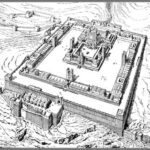The purpose of this essay is to suggest a practical course of action for Israel and the Jewish people that can be acceptable to supporters of opposing positions in the ongoing debate between Rabbi Chananya Weissman and his opponents and detractors.
To do this, I will attempt to explain why I believe Rabbi Chananya Weissman is right, even though he may seem wrong, while his opponents and detractors are wrong, even though they may seem right.
That is to say, I will explain why I believe that the truth is with Rabbi Weissman, even though some of his facts appear wrong, while I believe that the truth is not with Rabbi Weissman’s detractors, even though some of their facts appear right.
The reason for this assessment is that upon analysis, it turns out that the practical outcome of Rabbi Weissman’s position must, logically, obligate constructive action, while that of his opponents must logically discourage it.
To define the parameters of the debate: Rabbi Weissman has expressed the view that the State of Israel is led by enemies of the Jewish people, whose motivations are nefarious. He derives several corollaries from this proposition, including that nothing they say can be believed, and nothing they do can be trusted at face value. He says the Islamic attacker’s demeanor on Simchas Torah proves their confidence that the attack would succeed unopposed, and has thus asserted that the attacks on Israel were planned and executed with Israeli acquiescence at best, and active collusion at worst. He has stated that the Iron Dome anti-missile system is a fraud, and that Iranian missile attacks are theatrical. Finally, he has opposed fundraising efforts for poorly-equipped IDF combat units, and has called for mass desertion from IDF units, refusal of orders, and draft evasion.
Rabbi Weissman’s opponents say he does not trouble himself to answer their arguments with facts, but instead engages in personal attacks. They say his evidence for collusion is weak or nonexistent. They say he does not understand military discipline or procedure, and that his recommendations are outrageous, irresponsible, and dangerous.
Additionally, the detractors have expressed belief that governmental-caused COVID-related misery and deaths were the outcome of well-meaning buffoonery and incompetence, while Rabbi Weissman attributes them to deliberate policy. He says their role in the COVID agenda proves that they are irredeemable mass murderers.
Regarding Rabbi Weissman’s contention that missile attacks on Israel are fraudulent: It must be understood that the nature of warfare has changed, and, in the old sense of nations attempting to destroy an adversary’s ability to wage war, all war today is fraudulent.
In the case of Israel and Iran, both countries have benefitted for more than forty years from the role each play for the other as boogeyman.
In the 1980’s Israel’s role in diverting sophisticated weaponry to the Islamic Republic of Iran was only partially exposed in what came to be known as the Iran-Contra Affair. More specific examples, however, are less known.
For example, Soltam Systems, an Israeli kitchen equipment manufacturer and defense contractor located in Yokneam, Israel, has been involved in development and production of advanced artillery systems, including mortars.
After the 1979 Iranian revolution, and especially during the Iran-Iraq war, Israel sold enormous quantities of weapons to Iran. Soltam led the way in these sales, as Iranian artillery continued to fire shells produced on Soltam’s Yokneam production line. According to Victor Ostrovsky in By Way of Deception, the mortar sales to Iran were “keeping the company in business.”
In 1993, Hezbollah fired Soltam mortars at the Israeli Army in South Lebanon. These mortars had been sold years earlier to the Iranians, who then passed them on to Hezbollah1.
As George Orwell presciently described: “In our own day they are not fighting against one another at all. The war is waged by each ruling group against its own subjects, and the object of the war is not to make or prevent conquests of territory, but to keep the structure of society intact. The very word ‘war,’ therefore, has become misleading. It would probably be accurate to say that by becoming continuous, war has ceased to exist.”
Jews must therefore jettison their fear – fear that telegraphs panic to the enemy, such as the cringe-inspiring spectacle of religious Jews, including great rabbis and so-called Jewish news sites, reacting to false-flag incidents conceived for the purpose of frightening them with praises to Hashem for the great “miracle,” attributing the low casualty rate in a psychological operation to divine intervention.
Undeniably, Israeli towns and cities are being pounded by rocket fire, but this is not the whole picture. There is nothing new or surprising about military use of decoys as a form of psychological warfare. Police and armies do it all the time, as decoys play a crucial role in military missile doctrine, serving as a key element in deception strategies to mislead and confuse adversaries.
Historically, the concept of using decoys dates back to World War II, where the Soviet military extensively employed camouflage and dummy equipment to deceive German forces. This practice, known as “maskirovka,” involved creating fake artillery batteries, tanks, and troop positions to mislead enemy reconnaissance and divert attacks.
In contemporary warfare, decoys are used to protect high-value assets and enhance survivability. For example, decoys can simulate the electromagnetic signatures of real targets, drawing enemy fire away from actual military assets. This is particularly important in environments where advanced surveillance and targeting systems are in play.
The ongoing conflict in Ukraine has highlighted the importance of decoys in modern warfare. Both sides have used decoys to mislead enemy forces and protect their own assets, demonstrating the continued relevance of these tactics in high-intensity conflicts.
As we have previously noted, a large percentage of police traffic cameras are empty metal boxes. The IDF cannibalizes old jeeps for their front grille and headlights, to which they attach a kickstand, revolving yellow light, and car battery, and they set it up on a hill to appear as if an IDF patrol is in the area when in reality there is not. Like Jews, some Arabs are stupid, some are not.
It is not farfetched to posit that a large percentage of the projectiles fired at or over Israel are indeed glorified pyrotechnic displays, weaponized firecrackers for psychological warfare application. It is much, much cheaper than firing actual missiles. Nor is it farfetched to understand that Israel’s government and those directing them benefit from Israelis’ fear. Whoever does not understand this has never read Machiavelli. In politics, decency simply does not exist.
To understand what is meant by being wrong, even though one is right, in the context of wars and tyranny, let us examine the case of Rebbi Zecharyah ben Avkilus.
Rebbi Yochanan said: “The compliance of Rebbi Zecharyah ben Avkilus destroyed our home (Jerusalem), burned our Temple, and exiled us from our land.”
Rebbi Zecharyah ben Avkilus had intervened and prevented the rabbis from killing a man bent on vengeance on the Jewish people over a personal slight at a public party, Bar Kamtza.
Bar Kamtza reasoned: “Since the rabbis were sitting at the party and they did not rebuke the one who embarrassed me, they must be in agreement. I will take revenge and slander them to the authorities.”
He contrived to discredit the rabbis’ loyalty by convincing the Romans to try to offer a slightly blemished sacrifice in the Jewish Temple that would be disqualified and rejected according to Jewish law, but not Roman law.
Bar Kamtza brought the animal to the Holy Temple and, as expected, the blemish was discovered by the kohanim, who were aware of the identity of the person who had sent the sacrifice. They were faced with a dilemma: Should they offer the sacrifice despite the blemish in the face of political realities, or should they reject it?
They presented the question to the sages, who decided that the political considerations outweighed the halachic factor, given the delicate state of relations between the Roman emperor and his Jewish subjects.
Rebbi Zecharyah ben Avkilus, however, objected, pointing out that accepting the sacrifice might set a precedent, for people would not know the real reason why the blemished animal had been offered: “If we allow the animal to be offered, people will say that blemished animals may be sacrificed on the altar.”
The rabbis then considered killing Bar Kamtza, for his actions had endangered the community and he was worthy of death as an informer.
Rebbi Zecharyah again objected, pointing out that people would assume that Bar Kamtza had been sentenced to death for having blemished an animal that was to be offered as a sacrifice – a non-capital crime. The real reason why Bar Kamtza would be killed would have to remain secret, lest the Roman emperor learn of the decision not to offer his gift.
Rebbi Zecharyah ben Avkilus undoubtedly had his facts in order; his objections were enough to effectively paralyze the sages and thus facilitate the tragic chain of events that led to Jerusalem’s destruction. He was wrong, even though he was right.
Like Rebbi Zecharyah ben Avkilus, the detractors are focusing on the small picture to the exclusion of the pattern presented by the big picture. They are giving Israel’s leaders the benefit of the doubt and excoriating those who would expose them.
When Rebbi Yochanan said that Jerusalem was destroyed, the Temple burned, and we were exiled from our land because of the “compliance” of Rebbi Zecharyah ben Avkilus, the Hebrew word quoted in the Talmud is anvtanuto, which can be translated “humility,” “compliance,” “obedience,” or “tolerance.”
According to the Midrash, Rebbi Zecharyah ben Avkilus had been present at the party where Bar Kamtza was humiliated in public. He had not intervened at the time, and it is to this characteristic that Rebbi Yochanan refers. Rebbi Zecharyah ben Avkilus remained silent when he should have spoken up, and he spoke up when he should have remained silent.
Rabbi Weissman’s detractors claim they do not detect a pattern of behavior among Israel’s leaders that would suggest deliberate collusion in the expulsions, destruction, massacres, medical experimentation on the populace, devastation of the country, depletion of public funds, decline of commerce, and murder of thousands and displacement of scores of thousands that their policies have wrought.
Be that as it may, even Rabbi Weissman’s opponents will concede that there is a severe leadership crisis in Israel. Part of this is owing to the destructive flaws inherent in Israel’s political and judicial institutions.
Public discourse in Israel has been pervaded with Rebbi Zecharyah ben Avkilus-style cognitive dissonance, which thwarts the pursuit of Jewish national goals.
Rabbi Weissman and I have discussed in public fora his recommendation to disobey orders and his call for mass army desertion. I disagreed with him, pointing out that every soldier is specifically and extensively drilled in the importance of maintaining discipline to the success of military operations.
This is called “unity of command” in professional military doctrine and is a time-honored principle of crisis leadership. I believe those who would discourage refusing orders are following this principle when they speak against it.
However, this does not mean that Rabbi Weissman is wrong. “Unity of command” can be abused to suppress information needed for sound decision making. For example, before the Yom Kippur War, IDF officials suppressed “early warning” information about the impending Arab attack. The resulting “mechdal” (breakdown) pushed Israel close to the brink of destruction.
Perhaps a more nuanced call, not for a permanent state of military insubordination and draft evasion, but for a temporary but determined strike until IDF leadership and doctrine are rectified, would be acceptable according to both visions.
Similarly, Israelis can withdraw the legitimacy they have previously granted to Israeli elections and political parties, by refraining from participating in elections until the Jewish People in Israel have the opportunity to choose a form of district elections whereby citizens will vote for individual candidates rather than for fixed party lists.
Once the flaws of Israel’s political and judicial institutions are rectified, elections will resume, the IDF will truly become the army of the people, and the nation can finally be governed as a Commonwealth and Jewish State by the supreme authority of representatives of the People, not parties, in a new, Independent Knesset, which will appoint and constitute ministers and officials for the good of the people.
- 1. Patrick Cockburn, Israelis ‘backed arms sales to Iran’, The Independent, 18 July 1998 ↩︎





